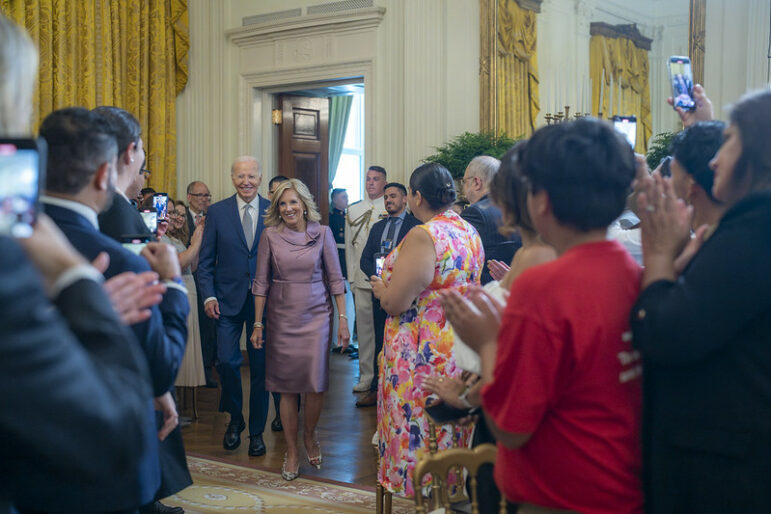On Aug. 19, the U.S. Citizenship and Immigration Services (USCIS) began accepting applications for the first step of the process under the Keeping Families Together program. A week later, however, a Texas judge put a temporary hold on parole. Here’s what we know.
Official White House Photo by Cameron Smith
President Joe Biden and First Lady Jill Biden arrive in the East Room of the White House on June 18, 2024, when they announced the Keeping Families Together program.
On June 18, President Joe Biden announced the Keeping Families Together program to create a new pathway for some undocumented spouses of U.S. citizens to adjust their status to lawful permanent residence, without having to leave the country.
The new rule applies to those who have been in the United States continuously since June 17, 2014, and were married by June 17, 2024. On Aug. 19, the U.S. Citizenship and Immigration Services (USCIS) began accepting applications for the very first step of the process: filling out an I-131F form.
However, Republican-led states sued in less than a week. And on Monday, Aug. 26, the United States District Court for the Eastern District of Texas put a temporary hold on granting parole in place (PIP)—giving immigrants who entered the country without inspection and are already here the option to stay.
“That ruling is wrong,” Biden said in a statement in response to the court decision. “These families should not be needlessly separated. They should be able to stay together, and my Administration will not stop fighting for them.”
The judge’s order has temporarily halted the granting of parole to pending applicants as the legal dispute plays out, and it’s currently unclear as to when—or how—the case will be resolved. But in the meantime, USCIS will continue to accept filed applications and schedule biometric appointments, according to an alert on the agency’s website.
In the past, couples seeking permanent residency through marriage had to have the person who had migrated to the U.S. return to their country of origin and wait to be processed abroad. With PIP, the Biden administration created a new way for undocumented spouses to stay in the U.S. without leaving their families behind, resulting in separations of years or even decades.
“I wanted to clarify that the current PIP does not offer a new form of permanent immigration relief or status per se,” explained Maria Huel, supervising paralegal at New York Legal Assistance Group (NYLAG)’s Immigrant Protection Unit, adding that entering without inspections is a barrier for those seeking permanent residency. So “PIP allows them to meet the ‘inspected and admitted or paroled’ requirement to adjust status,” Huel added.
Those granted PIP generally receive it for up to three years, during which they can also apply for a work permit and go through the not-so-easy process of obtaining a green card. USCIS indicates that “a grant of parole in place under Keeping Families Together does not establish eligibility for other immigration benefits, including lawful permanent resident status.”
City Limits has prepared this guide to give an overview of the very first step of filling out an I-131F form (Note: this is solely for informational purposes and does not constitute legal advice. For a list of city organizations offering immigration services, click here).
Who is eligible?
Noncitizen spouses of a U.S. citizen who are present in the country without admission or parole; have been continuously present for at least 10 years as of June 17, 2024; have a legally valid marriage to a U.S. citizen on or before June 17, 2024; and have no disqualifying criminal history.
“All felony offenses will be disqualifying under this process,” explains USCIS on its website.
Rex Chen, immigration director for Legal Services NYC, said this criteria is firm. “If you’ve been convicted of a crime of any kind, don’t bother, because they [USCIS] will say ‘Thanks for your money.’”
If the undocumented person has a child before marriage and marries a citizen, that child—the citizen’s stepchild—may also be eligible for parole.
“They said that if you are the stepchild of a citizen and your parent qualifies, then the stepchild can qualify,” Chen explained. “But the stepchild has to be here since June 2024 so they’re doing a different date for the stepchild than they are for the spouse.”
The stepchild of the citizen must be under 21, unmarried on June 17, 2024, have been continuously present in the country since that date, and meet the same eligibility standards as the parent under parole: be present in the United States without admission or parole, and have no disqualifying criminal history.
Also eligible for parole in place are undocumented widows and widowers of U.S. citizens who have not remarried, though they must meet other eligibility requirements, according to USCIS’ website. For more, click here.
How to apply?
One can only apply electronically using the Form I-131F (also known as the “Application for Parole in Place for Certain Noncitizen Spouses and Stepchildren of U.S. Citizens.”)
First, create a USCIS account. Each petitioner must file a separate I-131F form and it must be completed by the noncitizen spouse or stepchild, not the U.S. citizen. The application fee is $580, and there is no fee waiver or expedited processing available.
Since both the process and the form are new, USCIS has published a filing guide for Form I-131F.
What documentation is required?
There are several categories of documents required for the application.
Proof of Identity: Copy of an official identity document showing photo, name, and date of birth such as:
A valid government-issued driver’s license
Passport identity page
National identification document from your country of origin, with photo
Any other official ID document or school-issued ID with photo
For a stepchild of a U.S. citizen, the birth certificate with the noncitizen parent’s name.
Spouse/Stepparent’s Citizenship: Documentation proving the spouse’s U.S. citizenship, such as U.S. birth certificate, naturalization certificate, certificate of citizenship, consular report of birth abroad, or U.S. passport.
Marriage: Evidence of a marriage certificate, and documentation of termination of any previous marriages, if applicable. In the case of the loss of a spouse, the death certificate of the U.S. citizen spouse is required.
Continued presence: Documents in this category must include the name of the noncitizen spouse and cover a period of at least 10 years.
It can be lease agreements, rent receipts, utility bills (such as gas, electric, phone), tax returns, school records such as transcripts or report cards, medical records (that include the names of medical facilities, physicians, and dates of treatment), official religious records, attestations from religious institutions, unions, or other organizations, money order receipts, dated bank transaction records, automobile license receipts, “or any other document you believe is relevant,” notes the USCIS guide.
“This is the part where I think that a little bit of common sense, creativity, makes the most sense,” explained Luis Mancheno, director of immigration policy for Legal Services NYC’s Manhattan office. “No piece of evidence is too much.”
Lawyers recommend collecting a variety of documents as proof of presence in the country—and the more documents, the better.
“So I wouldn’t want to just show a rental agreement for one year. I would want to show other documents during the year,” said Margaret Martin, co-director of the immigrant and refugee services division at Catholic Charities of the Archdiocese of New York.
Since applications for the program just opened a few days ago, lawyers have not yet deciphered what kind of documents and how many per year are the minimum to prove successful continued residence in the country. “We certainly don’t have anyone in that gray area who was cutting it close,” Chen said.
“You do not need to submit documentation for every day, week, or month within that period,” reads USCIS guidelines. “USCIS will evaluate the totality of the evidence to determine whether you have established continuous physical presence for the required period.”
Narrative statement: Applicants must attach a narrative statement (at least 750 characters) describing why they’re deserving of a “favorable exercise of discretion.”
Positive factors to consider include community ties; the applicant’s particular vulnerability due to advanced age or youth; the length of time the applicant has been in the country; responsibilities such as parenting or caring for a U.S. citizen’s child, elderly parent, or relative; status as a victim or witness of a crime, civil rights violation, or employment violation under investigation by a labor agency; and the impact on other family members, including U.S. citizens and lawful permanent residents, among others.
“You never put in fake evidence,” Chen recommended. “Don’t make stuff up. We’re only telling what’s true, but if it does exist, let’s get it in there truthfully.”
“Positive factors refer to the individual merits of the applicant, such as their skills, contributions to the community, and other attributes that enhance their suitability,” said Huel. “Significant public benefits encompass broader societal advantages, like economic growth, community enrichment, or public health improvements.”
Are there any additional steps or requirements after submitting the application?
At an Application Support Center (ASC), the applicant must submit biometrics (“fingerprints, photographs, and a signature,” according to USCIS.)
“You must print your biometric services appointment notice and bring it with you to your appointment,” reads USCIS’ website.
The USCIS may issue a Request of Information (RFI) or Request of Evidence (RFE) if more information or evidence is needed. USCIS may also require the applicant to appear for an interview. When asked, the agency did not say in which cases it would do so.
“There’s really no guidance on when USCIS might decide to interview,” commented Martin.
“It’s too soon to tell, and they just started it, but we can look at other parole programs,” Chen noted. “There’s a decent chance that, if they do it like similar parole programs in the past, they will not make a decision until they’re totally convinced, and at that point, they don’t need the interview.”
Launched in 2019, City Limits’ “What You Need to Know,” series aims to provide New York’s immigrant and Latino communities with practical information and explainers on a variety of topics. A Spanish-language version of this piece is forthcoming.
Is there an issue you think we should tackle next? Please send your suggestions to Daniel@citylimits.org
To reach the reporter behind this story, contact Daniel@citylimits.org. To reach the editor, contact Jeanmarie@citylimits.org




